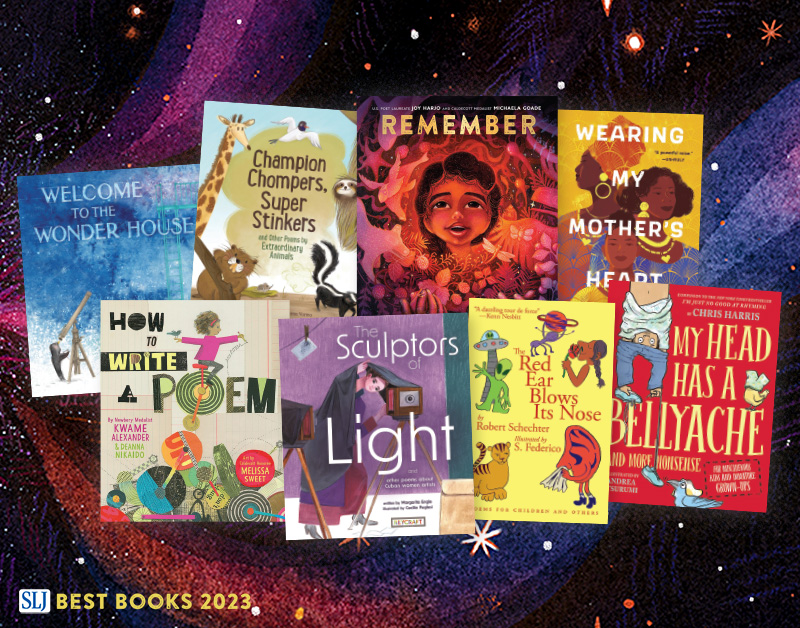What We’re Missing: Gems of World Kid Lit #3, edited by David Jacobson
It’s back!
For those of you keeping score at home, David Jacobson occasionally stops by this blog to highlight issues, books, and other topics pertaining to global children’s literature. Here in the States, many of us are awfully interested in what our homegrown writers create. We don’t really care much about the rest of the world. There are, however, some people who like to feel the pulse of what’s being published overseas. And since the Bologna Book Fair has been cancelled for 2020, consider this a tiny trip to other countries in the midst of an international lockdown.
Tchippo by Franz Hohler (1978). Switzerland: Luchterhand. Ages 10 and up. 192 pages.

Eight-year-old Tchippo suffers from a rare condition; he has very potent dreams. They spill over into real life, and there they can make quite a mess. One morning, Tchippo’s mother finds dirty fir cones in his bed. The next day she discovers a bicycle frame under the duvet, made of chocolate, and melting. She has to wash the sheets — again!
ADVERTISEMENT
ADVERTISEMENT
One night, Tchippo dreams he’s gone fishing on a lake, and the whole apartment gets flooded. Now things get serious, so his mother takes him to a doctor.
‘As far as we know there is only one man who had the same strange sickness,’ says the doctor. ‘Unfortunately, that man disappeared over a year ago.’ He prescribes sleeping pills. They should prevent dangerous dreams once and for all.
Sure enough, the dreaming disappears. The parents are relieved but Tchippo feels like he is no longer himself. One night he slips the pill into his pocket. The following morning the bed is empty; Tchippo has disappeared.
While his parents are panicking and the police are getting involved, Tchippo wakes up on a remote island and finds himself in the company of a pilot named Tchakko. Tchakko was on a rescue mission to save an endangered island kingdom, but his plane crashed. That was about a year ago. It turns out that Tchakko is the man the doctor had mentioned, the one with the same rare dreaming sickness as Tchippo, and they are not the only ones…
King Snarco, the ruler of these islands, suffers from the dreaming sickness too — a particularly serious case, in fact. He’s been dreaming for over a year, and if nobody stops him it will destroy the whole island kingdom. Tchippo and Tchakko must find the king and wake him up, hopefully before it’s too late.
As the two dreamers close in on their goal, Tchakko suddenly disappears. He gets sucked into the king’s dreaming. Now it is up to Tchippo to rescue the island kingdom all by himself.
Author Franz Hohler is an accomplished actor, musician, novelist, performer, playwright, poet, satirist, storyteller, and translator. He calls himself a ‘language artist’. During a career spanning more than half a century he has been dubbed the “doyen of Swiss Humor” and “the Swiss Dr. Seuss”.
Tschipo (the original German title of Tchippo) was Hohler’s first children’s novel. Now considered a classic of children’s literature, it has been translated into seven languages, including Dutch, French, Lithuanian and Spanish, but not English.
Franz Hohler’s work has been honored with 29 awards. In 2018, the author was nominated for the Hans Christian Andersen Award (HCAA). Tchippo was one of a select number of titles recommended by the HCAA committee for worldwide translation.
Reviewer: Veronika Bond has translated more than 20 books. Born into a German family, she grew up in Jordan speaking three languages. After earning a master’s degree in Language, Culture and Translation Studies from the Johannes Gutenberg Universität in Mainz (Germany) she relocated to the UK, met a handsome English poet, and has lived happily ever since in the English language. She is currently writing her first novel for children.
The Collector. Six Short
Stories about a Bad Wolf
by Soloúp, aka Antonis
Nikolopoulos (2018). Greece:
Ikaros. Ages 12 and up. 270 pages.

Soloúp (Antonis Nikolopoulos) is not only a well-known Greek political caricaturist, but also a researcher of graphic media. Widely known for his acclaimed historical graphic novel Aivali (2014 – for more information, see this review in the Guardian) about the massive population displacement following the Greco-Turkish war of 1919-1922, Soloúp has recently made headlines with yet another crossover graphic novel The Collector, this time addressing a pressing social issue.

The Collector is indeed what the title denotes; a collection of six narratives (all but the last in black and white) that weave together the story of a divorce, seen from the perspective of six different individuals. Contrary to reader expectations, instead of providing yet another depiction of an adolescent severely impacted by her parents’ divorce, the author shifts the emphasis from the child to the adult so as to shed light on the male divorcee who sees his bonds with his beloved daughter severely cut and irreparably harmed.

This graphic novel serves as a counter narrative to conventional notions of fatherhood in divorce mode; the father is constantly depicted as the one who perseveres to mend his broken relationship with his daughter. Each morning he appears standing in front of the once happy family home and “collecting” number plates of the taxis that take his girl to school since he himself is forbidden to do so.

The intertextual allusions to Little Red Riding Hood, Alice in Wonderland and Plato’s Myth of the Cave, found in the only colored story in the collection, can be perceived as the culmination of the fragmented narrative; these allusions serve to disrupt the commonly held view that the divorced father is estranged from his daughter. The plot of Little Red Riding Hood as we know it is cleverly challenged; Soloúp follows the lesser known second version of the Grimm’s tale and introduces the Mad Hatter and the Rabbit from Alice in Wonderland so as to cast doubt on Little Red Riding Hood’s idea about what had happened when she was a kid, rendering memory untrustworthy, slippery and forever fluid.
References to The Trial by Franz Kafka can be taken as allusions to the unusual jury formed outside court rooms by the protagonists of the six narratives. Soloúp takes up the issue of divorce and weaves a kaleidoscopic set of narratives around it by employing a multiplicity of voices and perspectives such as the neighbor’s, the grandparents’, the father’s … as if they were members of a jury. Yet, the mother’s voice remains curiously unarticulated. Whether an intentional choice or not, it leaves diligent readers wondering about the politics behind such a choice.
ADVERTISEMENT
ADVERTISEMENT
Although I prioritize the theme of the divorce in my reading, social issues such as broken friendships, racism leveled at immigrants, the relationship of humans to animals, and the issue of death are also taken up in Soloúp’s Collector.
Reviewer: Vassiliki Vassiloudi, Ph.D., teaches literature for children and young adults at the Department of Primary Education, Faculty of Education, Democritus University of Thrace, Greece. Her research has appeared in Greek and international refereed journals. In 2019 she received fellowships at both the International Youth Library, Munich, Germany and the Tsakopoulos Hellenic Collection, Sacramento State University.
Editor: David Jacobson a member of the board of the Global Literature in Libraries Initiative and on the committee for the 2020 GLLI Translated YA Book Prize. He is also author of Are You an Echo? The Lost Poetry of Misuzu Kaneko.
For those of you interested, you can check out David’s previous entries in this series Beyond 3 Percent: Translation Children’s Literature in the U.S. and The Japan-China-Korea Peace Picture Book Project.
Next time: A rare Finnish verse novel confronting sexual assault, and the Yiddish tales of a crime-fighting puppy in Depression-era New York.
Filed under: Guest Posts
About Betsy Bird
Betsy Bird is currently the Collection Development Manager of the Evanston Public Library system and a former Materials Specialist for New York Public Library. She has served on Newbery, written for Horn Book, and has done other lovely little things that she'd love to tell you about but that she's sure you'd find more interesting to hear of in person. Her opinions are her own and do not reflect those of EPL, SLJ, or any of the other acronyms you might be able to name. Follow her on Twitter: @fuseeight.
ADVERTISEMENT
ADVERTISEMENT
SLJ Blog Network
The Moral Dilemma of THE MONSTER AT THE END OF THIS BOOK
Winnie-The-Pooh | Review
Parsing Religion in Public Schools
ADVERTISEMENT







